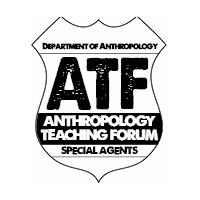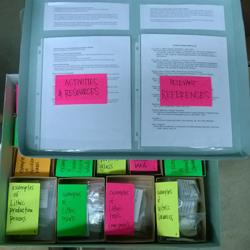
This post marks the beginning of a collaboration with the Anthropology Teaching Forum (ATF) at the University of Texas, San Antonio. Here, graduate student Leah McCurdy describes how the ATF was born and outlines its lofty goals. For those of you who aren’t lucky enough to have such an engaged teaching culture in your department, the ATF has been kind enough to share summaries of past talks in this post and future talks in future posts. We look forward to learning more from this graduate student-led initiative.
I am a PhD Candidate in the Department of Anthropology at The University of Texas at San Antonio (UTSA). In Fall 2013, I started teaching my own classes as an adjunct. I had a few grad student friends to chat with about teaching issues or ideas but these chats were more often than not grumblings about my students or the workload or how inadequate I felt. Over the course of that first semester, while closed door office rants helped me release some frustration, I recognized the need for an organized venue to talk about teaching so a larger group could benefit and contribute. Thus, the Anthropology Teaching Forum (ATF) was born.
Our cohort of grad students with a passion for teaching founded ATF to promote collaboration among faculty and grad students. We create directed discussion of pedagogical topics relevant to anthropology courses across the sub-disciplines. I hope that readers of this blog will be interested in our efforts to create an anthropology teaching community at UTSA and how such a group may be beneficial at other institutions. ATF has already been introduced through a previous blog post by UTSA Alumnus Will Robertson and comes in line with another post by UTSA professor, Dr. Jill Fleuriet. As a group, our posts describe the emphasis on teaching and grad student training at UTSA. ATF is one aspect of this teaching community developed by students to promote dialogue about teaching outside the classroom.
At the most basic level, ATF creates venues for discussion on a multitude of teaching topics relevant to anthropologists who teach and to general university level education. To create the most diverse discussions possible, we encourage graduate students and faculty members of all experience levels to join us, from fully tenured to tenure-track professor to adjuncts, teaching assistants, and graduate students with no teaching experience. We find that discussions are more well-rounded when a diverse set of participants can share about how a topic relates to their experiences and/or future expectations. Further, we are very keen to keep our discussions as relevant as possible. Therefore, we strive to explore each topic from a four-field anthropology perspective. We have ATF members from all anthropological sub-disciplines so our discussions often organically explore relevance for bio, arch, cultural, and linguistic foci. The overarching goal of ATF is to practice collaboration in teaching. It is common to feel insular and take on the lone-wolf professor persona. We find that we offer better classes and better assistance to our students as a result of our collaborations through ATF. We hope to foster and support good and effective teaching for adjuncts and professors to immediately implement in classes or for new graduate students to construct their personal vision of teaching for the future.
ATF Talks: Past, Present, and Future
Since Fall 2013, we have organized 7 successful meetings and discussions. Our topical foci are detailed below:
Alternative (Non-Traditional) Assessment
In Fall 2013, our inaugural meeting focused on workshopping non-traditional assessment techniques including semester-long tests and seminar assessment as an alternative to traditional scantron testing.
Experiential Learning
In Spring 2014, we began by discussing the merits of experiential learning and creating hands-on opportunities for each sub-discipline.
Supporting and Encouraging Unprepared Students
Based on student demographics at UTSA (and other similar institutions), we discussed how to work with students who enter college unprepared for academic rigor and the demands of anthropology courses.
Using Clickers to their Full Potential
Several ATFers frequently use clickers in their classes. They offered key insights into how to effectively integrate clicker technology to improve student and instructor feedback, discussions, and active engagement.
Developing Courses around Controversial Topics
To end the Spring 2014 series, we explored the value of bringing controversial topics (such as evolution or gender bias) to the forefront in class.
Guerrilla Teaching
In September, we discussed an innovative teaching style based on guerrilla warfare tactics! We outlined the premise of guerilla teacher invasion and discussed how two ATF members implemented it in an upper-division anthropology class in Spring 2014 with excellent results.
Teaching Philosophies
In October, we explored teaching philosophies and how new or aspiring educators can solidify and articulate their personal teaching philosophy. We discussed and practiced a guided reflection exercise.
Engaging Big Classes
In November, we look forward to discussing techniques to conduct active learning in classes with long rosters. We will explore a specific example of using proxemics in a linguistics course.
Student Empowerment
In December, as an update to our Supporting and Encouraging Unprepared Students discussion, we will focus on student empowerment and the ways that professors can empower academically confident students through their anthropological content and activities in class.
All topics and meeting discussions are extensively recapped on the ATF website. By clicking each link above, you will be directed to each specific post as well. We look forward to a new collaboration with this Teaching Culture blog to post our meeting recaps in what will be called the Anthropology Teaching Forum series! Stay tuned for recaps of our Teaching Philosophies, Engaging Big Classes, and Student Empowerment discussions soon!
Experiential Learning, Community Outreach, and More!
 Several members have taken direct inspiration or insight from our meetings and implemented innovations in their classes. For example, one member incorporated a controversial topics section into their syllabus. Further, as an organization, we are applying our discussion on experiential learning to create departmental resources for hands-on instruction. In conjunction with the UTSA Center for Archaeological Research Legacy Program, we are creating resources for any instructor or teaching assistant to utilize for undergraduate or graduate learning experiences. Read more about the artifact, dendrochronology, faunal, ethnoscience, and cultural contact collections here. We hope that these resources will promote hands-on, experiential, and active learning in UTSA classrooms to bring the experience of doing anthropology right to the students.
Several members have taken direct inspiration or insight from our meetings and implemented innovations in their classes. For example, one member incorporated a controversial topics section into their syllabus. Further, as an organization, we are applying our discussion on experiential learning to create departmental resources for hands-on instruction. In conjunction with the UTSA Center for Archaeological Research Legacy Program, we are creating resources for any instructor or teaching assistant to utilize for undergraduate or graduate learning experiences. Read more about the artifact, dendrochronology, faunal, ethnoscience, and cultural contact collections here. We hope that these resources will promote hands-on, experiential, and active learning in UTSA classrooms to bring the experience of doing anthropology right to the students.
We are also extremely excited about a new community outreach project! We are sponsoring a fundraiser for bringing learning technologies to primary and secondary school kids in Belize! As a result of our clickers discussion, we are working to raise funds and collect donations of digital projectors and clickers for Mount Carmel School in Benque Viejo del Carmen, Belize. We are raising funds to purchase used clickers and projectors and we will be collecting donations of gently used clickers from graduating seniors at UTSA. These efforts allow us to be part of a broader community of teachers and reach out to global learners!
We see ATF as a platform to improve and innovate in our own teaching, serve our Department of Anthropology, provide support to anthropology educators, and engage with learners of all ages! We look forward to expanding our membership beyond UTSA and/or collaborating with other like-minded organizations. We are already practiced at involving distant members via Skype. We are also excited about increased faculty involvement in our meetings and service opportunities. We feel that building connections between faculty and grad students on the subject of teaching is crucial to well-rounded doctoral training. We will also incorporate updates on past topics into future meetings to discuss how members implemented ideas into their own teaching. This will be a crucial way to demonstrate the importance of collaboration and the benefits of our meetings. We hope that this will encourage new members to continue joining us and pursuing their own collaborative plans in their teaching.
Leah McCurdy can be reached directly at leah.mccurdy@mavs.uta.edu.



